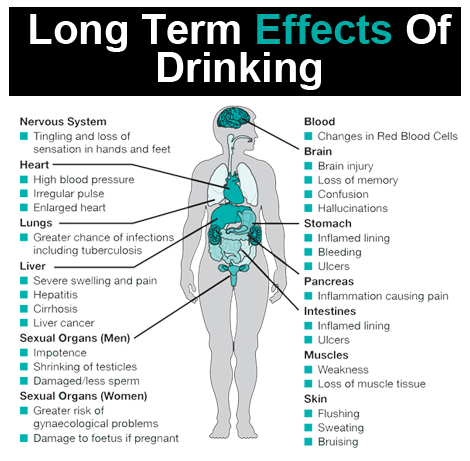According to a study by Recovery Brands, it was found that roughly 14 million adults in the United States have an alcohol-related problem. That’s one in every 13 adults! What’s worse is that over 3 million teenagers, ages 14 to 17, also suffer a form of alcoholism and substance abuse. It just goes to show that perhaps one too many drinks at a party, curiosity, or making alcohol a part of your social life can turn into a lifetime of addiction.
Alcohol abuse occurs for multiple reasons: a lack of self-esteem, using it as a coping mechanism to numb stress, and even unawareness of one’s daily alcohol intake – just to name a few examples. However, despite these disheartening statistics, properly educating yourself on the issue and the consequences of alcohol consumption can help you make better drinking decisions in the future.
These are the long-term effects of alcohol abuse:
Impaired cognitive function
When excessively consumed, alcohol diminishes shrinks frontal lobes of the brain which are the areas directly connected to motor function, coordination, and attention span. Over time, alcohol completely deteriorates the cells within the brain, destroying the quality of cognitive function, permanently impairing rational judgment even when one is sober, and increasing the risk of developing dementia and Alzheimer’s. Furthermore, since alcohol is a depressant, it’s a catalyst for depression and mental illness. All of these symptoms can become more intense during the alcohol withdrawal phase.
Fatal liver problems
The liver is the main organ in our body that flushes out toxins. Alcohol causes cirrhosis or chronic inflammation within it. Evidently, the organ attempts to repair itself which creates scar tissue. If alcohol is consumed daily and abused, it continuously manifests this scar tissue which will at one point disrupt the liver’s blood flow. Without proper circulation, the liver cannot function properly, resulting in its inability to no longer process fat which will build up in the organ. In conjunction, this process metabolizes acetaldehyde, a toxic enzyme created from the interaction between alcohol’s enzyme, dehydrogenase. If acetaldehyde is produced in influx, it damages liver tissue. Eventually, this can lead to liver cancer and even death if not immediately treated.
Weakened cardiovascular health
Alcohol increases high blood pressure and causes irregular heartbeat and hypertension, which increases the risk of suffering stroke or heart attack. Furthermore, alcohol causes cardiomyopathy, the disease that weakens heart muscles and constricts proper and efficient blood flow. This condition can ultimately cause heart failure and premature death. Lastly, alcohol makes you gain weight since it temporarily prevents your body from burning fat. While there may have been a saying that “a glass of wine a day helps the heart,” approach this statement with caution.
Pancreatitis and Pancreatic Cancer
Just like your liver, alcohol causes scarring in the tissues of the pancreas as well and is untreatable. The pancreas serves to detoxify harmful substances in the body, cleanse the blood, and produce nutrients. An excessive amount of scar tissue encompassing an organ will always make it difficult for it to function normally. Individuals can consequently develop pancreatitis or pancreatic cancer, which has a survival rate of 20% for the first year, but 7% after five.
Birth defects and infertility
Pregnant women should never drink alcohol. A baby will suffer fatal birth defects to both their brain and body, or die prematurely altogether. This is called “fetal alcohol syndrome,” and it is untreatable. The baby would suffer from the consequences for the rest of its life. Furthermore, alcohol consumption can cause infertility and reduce the chances of conception. But women are not limited to the risk of infertility. There have been cases where men have also been victim to it since alcohol lowers their production of testosterone and sperm quality.

Stomach and intestinal ulcers
Alcohol deteriorates the stomach lining over time and causes the production of Helicobacter pylori (H. pylori), the bacteria responsible for generating peptic ulcers, open sores that decorate the inside of the stomach lining and cause bleeding. This condition is known as gastritis. Also, it causes stomach acid to burn your throat and create the sensation of heartburn.
Putting yourself at risk for alcohol addiction is never worth the trouble. Therefore, it’s imperative that you understand that beyond the fun and games, socializing, and happy hour, there is a possibility of abusing alcohol without ever meaning to do so. Yes, there are short-term effects that usually disappear in the morning and do not severely harm you, such as a headache or hangover, but the long-term effects are right around the corner if alcohol is an integral part of your life. That’s not to say you can never have your favorite glass of wine or bottle of beer ever again; you just need to be more mindful, not habitual, with your drinking habits and consumption levels and simply enjoy alcohol in moderation.

RD Neha Kava
Latest posts by RD Neha Kava (see all)
- Health Benefits of Carrot Juice - April 4, 2024
- Tips to loose weight in 1 month - April 2, 2024
- Balanced Diet - March 29, 2024



